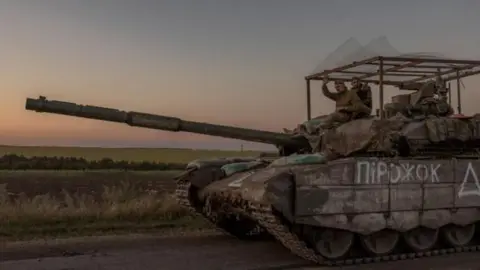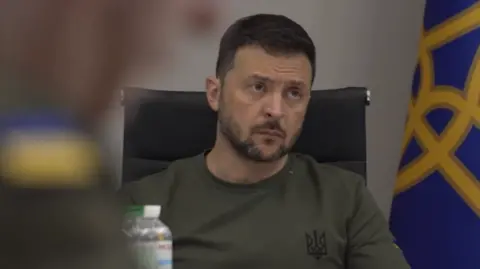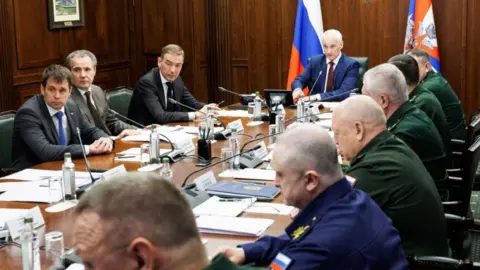 Getty Images
Getty ImagesUkraine has set up a military administrative office in Russia’s Kursk region, where its surprise incursion into Russian territory continues, according to its top military commander.
Gen Oleksandr Syrsky said the office would “maintain law and order” and “meet the immediate needs” of the population in the area.
In a video posted on social media, Gen Syrsky is seen telling a meeting chaired by Ukrainian President Volodymyr Zelensky that the office has been created “on the territories controlled by Ukraine”.
Russian Defence Minister Andrei Belousov has said Moscow will send reinforcements to “safeguard” the population in the region.
 Facebook / Volodymyr Zelensky
Facebook / Volodymyr ZelenskyUkraine also claimed to have made further gains in its incursion on Thursday.
Ukrainian troops were 35km inside the Kursk region, where they control 1,150sq km of territory, including 82 settlements, Gen Syrsky said.
Now on its 10th day, this is Ukraine’s deepest incursion into Russia since Moscow launched its full-scale invasion in 2022.
But Kyiv has said it is not interested in “taking over” Russian territory.
Instead, the incursion is an attempt to pressure Moscow into agreeing to “restore a just peace”, Ukrainian foreign ministry spokesman Heorhiy Tykhy told reporters on Wednesday.
In light of the incursion, Russian officials have prepared plans for “additional measures” to safeguard the population and infrastructure in areas bordering Ukraine.
The measures involve improving the “management of troops” in the Belgorod region, which neighbours Kursk, according to a video published on the Russian defence ministry’s Telegram channel.
Interfax news agency said the plan would also apply to Kursk and Bryansk regions. All three border Ukraine.
Russia has also declared a federal level emergency in the Belgorod region. On Monday, 11,000 people were evacuated from the Krasnaya Yaruga district in Belgorod, according to Russian state news agency Tass.
Despite this, Moscow also claims it has recaptured some lost territory. In a statement, the defence ministry said it had regained control of the Krupets settlement in the Kursk region.
 Reuters
ReutersThe developments came as a UK source confirmed to the BBC that tanks donated by the UK had been used during Ukraine’s Russian incursion.
The UK Ministry of Defence did not officially comment on which specific UK weapons have been used by Ukraine, but the department reiterated that Ukraine had a “clear right” to use UK-supplied weapons for “self-defence against Russia’s illegal attacks”.
The UK was one of the first countries to provide modern Western battle tanks to Ukraine, donating 14 Challenger 2 tanks in the past year. But that was for a Ukrainian offensive to recapture its own territory.
The Ministry of Defence has insisted that there has been no change in policy.
Military equipment supplied by the United States and Germany is also being used for Ukraine’s incursion.
None of those countries have raised objections about their equipment being used for the offensive. But given the secrecy surrounding the operation, few would have known Ukraine’s intentions in advance.
There may still be concerns in the West about what happens next. Not just over whether Ukraine could suffer significant losses and come back asking for more. But more importantly, there will be some who may worry about how Russia responds.
The Kremlin has already accused the West of being behind the attack on its territory. The fact that Western weapons are involved could be seen as evidence for that charge.
Escalation is always a worry when it involves a nuclear armed state, and the Kremlin has not been afraid to occasionally rattle its nuclear sabre.
But it has also set down many red lines that have already been crossed.
It warned the West not to supply Ukraine with tanks in the first place. That warning was eventually ignored.
There is, however, still one big restriction. No Western country has given Kyiv the green light to use their long-range missiles to strike targets inside Russia.
Britain, France and the US have all provided some – but with the caveat they must be used inside Ukraine. That includes Crimea.
President Zelensky has repeatedly pleaded for those caveats to be lifted.
Read More: Ukraine sets up military office in Russia as incursion grows


